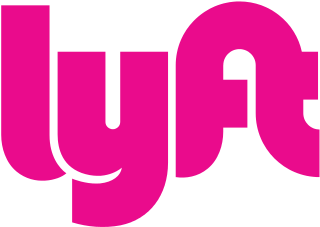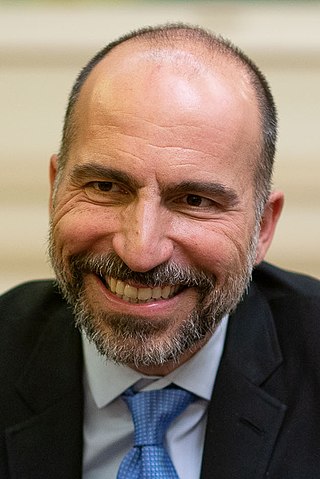
Uber Technologies, Inc., commonly referred to as Uber, is a multinational transportation company that provides ride-hailing services, courier services, food delivery, and freight transport. It is headquartered in San Francisco, California, and operates in approximately 70 countries and 10,500 cities worldwide. It is the largest ridesharing company worldwide with over 150 million monthly active users and 6 million active drivers and couriers. It facilitates an average of 28 million trips per day and has facilitated 47 billion trips since its inception in 2010, after which it grew rapidly, becoming a financial unicorn and disrupting the taxicab business. In 2023, the company had a take rate of 28.7% for mobility services and 18.3% for food delivery.

Equifax Inc. is an American multinational consumer credit reporting agency headquartered in Atlanta, Georgia and is one of the three largest consumer credit reporting agencies, along with Experian and TransUnion. Equifax collects and aggregates information on over 800 million individual consumers and more than 88 million businesses worldwide. In addition to credit and demographic data and services to business, Equifax sells credit monitoring and fraud prevention services directly to consumers.

Lyft, Inc. is an American company offering mobility as a service, ride-hailing, vehicles for hire, motorized scooters, a bicycle-sharing system, rental cars, and food delivery in the United States and select cities in Canada. Lyft sets fares, which vary using a dynamic pricing model based on local supply and demand at the time of the booking and are quoted to the customer in advance, and receives a commission from each booking. Lyft is the second-largest ridesharing company in the United States after Uber.

Wheely Ltd., commonly known as Wheely, is a Russian/Swiss-founded British vehicle for hire company based in London that allows users to book chauffeur-driven journeys in a luxury vehicle either on-demand or in advance. Its services are accessed through its mobile apps on the Android and iOS operating systems, and are available in London, Paris, Moscow, and St. Petersburg. Wheely launched in Dubai in 2024.

Dara Khosrowshahi is an Iranian-American business executive who is the chief executive officer of Uber. He was previously CEO of Expedia Group, a company that owns several travel fare aggregators. He is on the board of directors of BET.com and Hotels.com, and previously served on the board of The New York Times Company.

Travis Cordell Kalanick is an American businessman best known as the co-founder and former chief executive officer (CEO) of Uber. Previously he worked for Scour, a peer-to-peer file sharing application company, and was the co-founder of Red Swoosh, a peer-to-peer content delivery network that was sold to Akamai Technologies in 2007.

A ridesharing company, ride-hailing service, is a company that, via websites and mobile apps, matches passengers with drivers of vehicles for hire that, unlike taxis, cannot legally be hailed from the street.

Ryan Graves is an American billionaire, a former CEO and member of the board of directors of Uber, and a current member of the board of directors of Charity: Water, Pachama, and Metromile. He is also the CEO of Saltwater, his family office.

Ola Cabs is an Indian multinational ridesharing company, headquartered in Bangalore. It also operates in other business verticals including financial services and cloud kitchens.
The legality of ridesharing companies by jurisdiction varies; in some areas they are considered to be illegal taxi operations, while in other areas, they are subject to regulations that can include requirements for driver background checks, fares, caps on the number of drivers in an area, insurance, licensing, and minimum wage.

Grab Holdings Inc. is a Malaysian multinational technology company headquartered in One-North, Singapore. It is the developer of a super-app for ride-hailing, food delivery, and digital payments services on mobile devices that operates in Singapore, Malaysia, Cambodia, Indonesia, Myanmar, the Philippines, Thailand, and Vietnam.
DoorDash, Inc. is a San Francisco–based company that operates an online food ordering and food delivery platform. It trades under the symbol DASH. With a 56% market share, DoorDash is the largest food delivery company in the United States. It also has a 60% market share in the convenience delivery category. As of December 31, 2020, the platform was used by 450,000 merchants, 20,000,000 consumers, and one million delivery couriers.
Careem is a Dubai-based super app with operations in over 100 cities, covering 12 countries across the Middle East, Africa, and South Asia regions. The company, which was valued at over US$2 billion in 2018, became a wholly-owned subsidiary of Uber after being acquired for $3.1 billion in January 2020. Careem expanded into the food delivery business with Careem Now in November 2018 and launched a digital payment platform, Careem Pay in April 2022. In April 2023, Careem's Super App business was spun out into a new legal entity, which e& acquired a 50.03% stake in, while Uber maintains full ownership of Careem's ride-hailing business.
The Internet service company Yahoo! was subjected to the largest data breach on record. Two major data breaches of user account data to hackers were revealed during the second half of 2016. The first announced breach, reported in September 2016, had occurred sometime in late 2014, and affected over 500 million Yahoo! user accounts. A separate data breach, occurring earlier around August 2013, was reported in December 2016. Initially believed to have affected over 1 billion user accounts, Yahoo! later affirmed in October 2017 that all 3 billion of its user accounts were impacted. Both breaches are considered the largest discovered in the history of the Internet. Specific details of material taken include names, email addresses, telephone numbers, encrypted or unencrypted security questions and answers, dates of birth, and hashed passwords. Further, Yahoo! reported that the late 2014 breach likely used manufactured web cookies to falsify login credentials, allowing hackers to gain access to any account without a password.
Snapp! is an Iranian vehicle for hire company, headquartered in Tehran that launched in February 2014. Users can request a ride via the iOS, Android, or web application, by indicating their location and destination. The price of the trip is set beforehand, to eliminate bargaining. Snapp! commissions drivers upon completing a background check, and showing a valid driver's license and insurance before hiring them.

#GrabYourWallet is an organization and social media campaign that is an umbrella term for economic boycotts against companies that have any connections to Donald Trump in response to the leak of a lewd conversation between Donald Trump and Billy Bush on the set of Access Hollywood where he said "grab them by the pussy". The movement has particularly targeted Uber and Trump's daughter Ivanka Trump's clothing and shoe line, which was carried by Nordstrom before being indefinitely discontinued due to poor sales as a result of the boycott.
In the 2010s, personal data belonging to millions of Facebook users was collected without their consent by British consulting firm Cambridge Analytica, predominantly to be used for political advertising.
CloudKitchens is a ghost kitchen company started by Diego Berdakin and EarthLink founder Sky Dayton in 2015. Travis Kalanick, cofounder of Uber, bought control of the company in 2018.
Joe Sullivan is an American Internet security expert. Having served as a federal prosecutor with the United States Department of Justice, he worked as a CSO at Facebook, Uber and Cloudflare. For his role in covering up the 2016 data breaches at Uber, he was convicted in October 2022 on federal felony charges of obstruction and misprision. In January 2023, he took on the role of CEO of Ukraine Friends, a nonprofit focused on humanitarian aid to Ukraine.

The Uber Files are a leaked database of Uber's activities in about 40 countries from 2013 to 2017 leaked by former senior executive Mark MacGann, who admits being "partly responsible", and published by The Guardian on 10 July 2022, which shared the database of more than 124,000 files with the International Consortium of Investigative Journalists (ICIJ) and 42 other media outlets. They included e-mails, iMessages and WhatsApp messages sent between its senior leadership, as well as memos, presentations and other internal documents. The documents revealed attempts to lobby powerful figures including George Osborne, former Chancellor of the Exchequer, German chancellor Olaf Scholz during his mayorship in Hamburg, Germany, and U.S president Joe Biden during his vice presidency, along with re-elected French president Emmanuel Macron secretly aiding Uber lobbying in France during his cabinet membership on the French government. The files also document the use of tools such as "greyball", used to mislead local police, and a kill switch deployed during police raids to conceal data. Former Uber CEO Travis Kalanick dismissed concerns from other executives that sending Uber drivers to a protest in France put them at risk of violence from angry opponents in the taxi industry, saying "I think it's worth it, violence guarantees success".











